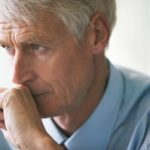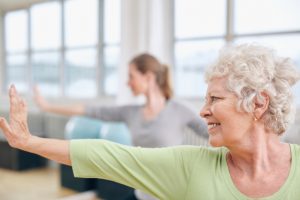You may have a love-hate relationship with yoga. As a matter of fact, I love the high I get from a good workout that includes some sun salutations and downward dogs. But some people may I hate that some of the poses show how tight and inflexible we have become.
Pigeon pose, where you pretzel your leg under by bending at the knee and rest on your hips with your other leg stretched straight out in back of you.
That’s not an easy one for someone who sits a lot during the workday and, as a consequence, tends to be extremely tight in the hips.
But I always feel energized and relaxed after a class – never a bad thing! – and yoga has so many healing benefits.
A study last year out of the University of Illinois found that practicing yoga consistently for eight weeks will improve your thinking and memory function.
Researchers tested yoga participants against a group of people who just did stretching and toning exercises. Clearly, there’s something to this mind-body practice that is more than breaking a sweat and feeling at peace with the world.
Improve mental health with yoga
 But I can understand why some people might be a little reluctant to step into a room full of yogis who look more like ballet dancers with impeccable posture and long, flexible limbs.
But I can understand why some people might be a little reluctant to step into a room full of yogis who look more like ballet dancers with impeccable posture and long, flexible limbs.
That can be intimidating, especially for older adults who haven’t tried yoga before or have trouble getting up from their chair after a long sit. No one wants to feel anxious and completely out of place. And it seems counterintuitive when you’re trying to find your inner happy place.
Men, especially, don’t like to put themselves in situations where they feel uncomfortable and less than knowledgeable. They don’t ask for directions or like to see their doctor for this very reason. Sound familiar?
It turns out, though, that yoga might be just what seniors need, elderly men in shorts included. The practice can help older adults battle depression and anxiety. That’s a huge concern for this age group with mental decline a growing issue, and reports of addiction and misuse of prescription medication on the rise.
To complicate matters, many seniors assume that poor mental health is simply a part of aging and they just have to live with it. They don’t reach out for help or be proactive with diet or exercise. I’d like to make this a wakeup call to change all that, because you can change it. Here’s proof…
Yoga most effective, lasting relief for depression, anxiety
 A review of studies on relaxation exercises, published in the journal Aging & Mental Health, found that the ancient practice of yoga offered the most effective, lasting relief from depression and anxiety.
A review of studies on relaxation exercises, published in the journal Aging & Mental Health, found that the ancient practice of yoga offered the most effective, lasting relief from depression and anxiety.
Researchers say up to 40 percent of older adults report anxiety and anywhere from 15 to 20 percent experience depression, making a case for relaxation techniques for the over-60 age group.
They looked at 15 studies from the last 20 years to determine the best of these six techniques: Yoga, listening to music, tensing and relaxing different groups of muscles, massage therapy and stress management training.
While I enjoy a great massage and value the restorative power of human touch, massage therapy didn’t come near the top of the list.
Yoga, music intervention and the muscle tensing and relaxing exercise (called PMRT, for progressive muscle relaxation training) were considered best for depression, and the music and yoga interventions were the best for relieving anxiety.
But it is yoga that has lasting effects, which is important when it comes to signs of mental health issues.
You want an intervention that does not just mask the symptoms, but gets to the root of the problem. With yoga, seniors experienced all the positive effects from the breathing, stretching and meditation exercises.
Study authors say yoga’s relief from depression and anxiety lasted six months longer for seniors.
“It could help counterbalance the negative effects of aging, improve physical functioning, postpone disability, decrease morbidity and mortality, stimulate the mind, and increase hope, reducing the risk of anxiety and depression,” the authors wrote.
While medication and counselling can certainly help, why not try a beginners’ yoga class?
Or start with a DVD so you can try some basic poses at home, and then join a class. You may get more out of professional instruction in a class setting because proper form and breathing is key to safety and getting the most out of the practice.
Plus, you’ll meet other beginners and make some new connections, also shown to be great for mental health and overall well-being.
It’s well worth that initial awkwardness of your first downward dog on the mat.


No comments:
Post a Comment